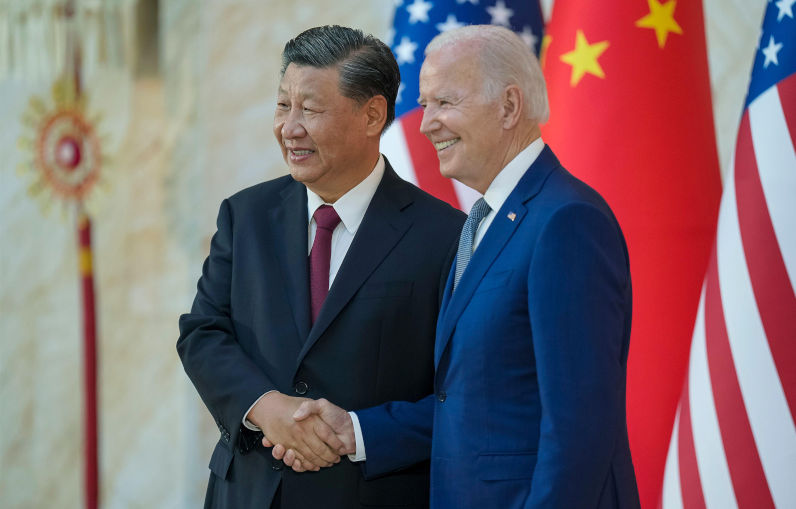Biden and Xi should follow their generous instincts
October 22, 2023
President Joe Biden last June showed his ignorance and arrogance to the world, when he called President Xi Jinping a dictator. Apparently he does not realise the weight of his remark. As the leader of the worlds most powerful country, President Biden should understand that the responsibility of a leader must be to serve the countrys best interests. Given this imperative, no decent leader can be a dictator, because a leader, to be effective, must follow the dictates of the laws of nature.
A dictator is one who will have his way, regardless of the consequences. To have ones way, instead of following the laws of nature and the laws of the market, a leader is doomed to fail as a leader. The economy would implode; the countrymen would suffer; and the social fabric of the country would fall apart.
A good leader of a country must have the capability of understanding the problems the country is facing, and seeing things in perspective. He must understand the meaning of public interest and strive to further the interest of all countrymen. He has to follow the dictates of the laws of nature (including the laws of the market and human nature). To call a leader of a country a dictator is to say that this leader ignores his responsibility and imposes his will arbitrarily against the laws of nature.
To be a good leader, one must give up any tendency for arrogance. One must recognise that there is no room to dictate anything but always a need to correct mistakes. One has to respond to the challenges as they arise, avert dangers and grab opportunities: not opportunities for ones aggrandisement, but for furthering the countrys best interests.
The US passed the $1.2 trillion Infrastructure Investment and Jobs Act in 2021 with bipartisan support, and many states are now rebuilding their roads and bridges, refurbishing ports and airports, and upgrading their electric, water and broadband utilities. President Biden early this year further announced a major infrastructure refurbishment initiative. Almost $1.2 billion has been awarded to fund nine projects across the country under the new National Infrastructure Project Assistance (Mega) discretionary grant program. The Department of Transportation website says the Mega program will fund a total of $5 billion through 2026 to help rebuild the Americas infrastructure for the benefit of Americans now and for generations to come. This is great.
Similarly, China under President Xi is also heavily investing in infrastructure. According to a report from Nikkei Asia, a five-year transportation infrastructure investment plan for highways, high-speed rail and airports will drive spending vigorously, after a record-setting 2022. The plan would expand expressways under the central government’s purview to 130,000 kilometres by 2027, up 11% from the end of 2021, adding to what is already the biggest such network in the world. By comparison, the U.S. had about 98,000 km of expressways as of 2020, based on data from the Federal Highway Administration. China is a vast country like the United States. The country has in the past developed very unevenly. President Jiang Zemin in 1999 judged that infrastructure development is necessary to narrow the regional disparity. President Xi followed his footsteps. Many new speed rail projects have been completed and many are still in the pipeline. What President Jiang and President Xi have done is dictated by the needs that China faces. Why then call President Xi a dictator since he was doing what President Biden is doing for America?
President Biden perhaps called President Xi a dictator simply because he was not elected into office. However, it is not clear that being popularly elected is correlated with being a good leader. In his book War on the Ballot recently published by Columbia University Press by Andrew Payne says that many American Presidents resort to war because of electoral politics. His book was reviewed by historian Julian Zelizer in Foreign Policy (published September 10 2023):
It is an inconvenient truth, Payne writes, rarely admitted, that leaders habitually take electoral considerations into account when making decisions about military and diplomatic strategy in war. In Zelizers view, for every military brass or State Department expert in the situation room advising the president on the best path forward for U.S. troops, another advisor is warning about the impact these policies might have on the next election. Another review on Amazon says Payne demonstrates how the exigencies of the electoral cycle drove leaders to miss opportunities to limit the human and financial costs of each war, gain strategic advantage, or sue for peace, sometimes making critical decisions with striking disregard for the consequences on the ground.
American presidents have, then, often been dictated by election considerations in military decisions. But is this good for the country? Electoral politics often brings out the worst in human nature. Chinas political system may not be superior to Americas, but on this count alone it has merit. Is that not clear by now, given recent events in US politics?
President Xi, like other leaders in China before him, follows the dictates of the national interest, and humbly bows to the laws of nature and the laws of the market. Humans are imperfect and mistakes are unavoidable. Humility is always required.
Will President Biden lay down his arrogance and follow the laws of nature and the laws of the market?
Or will he instead set those laws aside and govern based on electoral politics, no matter the cost?
